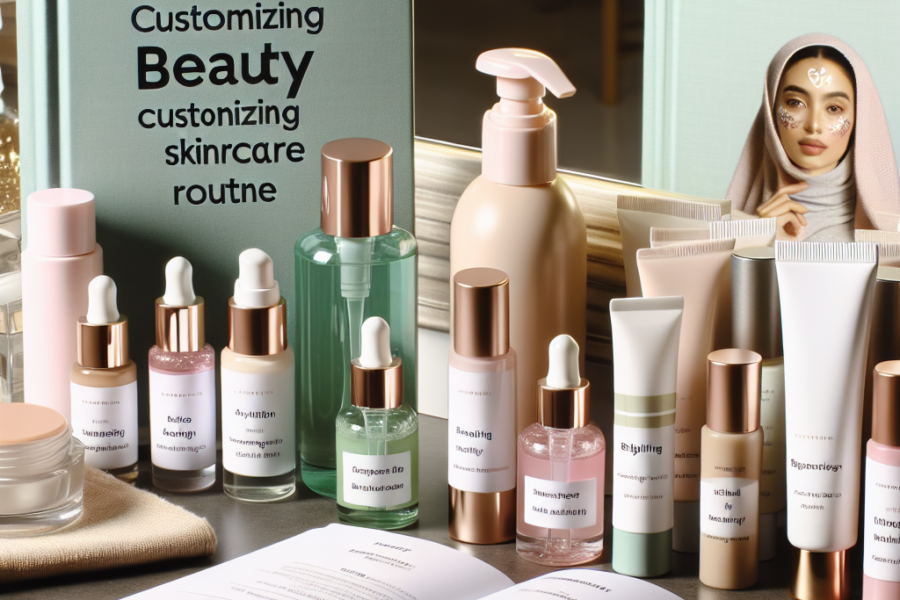As we age, our skin goes through a variety of changes that can leave it looking less than youthful. From wrinkles and fine lines to dullness and sagging, aging skin can be a challenge to address. Fortunately, the skincare industry has developed a wide range of products and treatments to help combat the signs of aging. One of the key components of anti-aging skincare is the use of specific ingredients that have been scientifically proven to rejuvenate and revitalize the skin. In this article, we will explore the science behind some of these ingredients and how they work to turn back the clock on aging skin.
Understanding the Science of Aging Skin
Before delving into specific anti-aging ingredients, it is important to understand the science behind aging skin. As we age, our skin undergoes a number of changes that contribute to the visible signs of aging. These changes include:
- Decreased collagen production: Collagen is a protein that provides structure and support to the skin. As we age, our bodies produce less collagen, leading to sagging and wrinkles.
- Loss of elasticity: Along with decreased collagen production, skin also loses its elasticity as we age. This can result in sagging and drooping skin.
- Slower cell turnover: As we age, the rate at which our skin cells turnover slows down, leading to a dull, rough complexion.
- Increased free radical damage: Free radicals are unstable molecules that can damage skin cells and accelerate the aging process. As we age, our bodies produce more free radicals, leading to increased damage to the skin.
By targeting these underlying causes of aging skin, anti-aging skincare ingredients can help to rejuvenate and revitalize the skin, restoring a more youthful appearance.
Key Anti-Aging Skincare Ingredients
There are a wide variety of anti-aging skincare ingredients on the market, each with its own unique benefits and mechanisms of action. Some of the most popular and effective ingredients include:
Retinoids
Retinoids are a class of compounds derived from Vitamin A that are highly effective in reducing the signs of aging. Retinoids work by increasing cell turnover, stimulating collagen production, and reducing the appearance of fine lines and wrinkles. They can also help to fade dark spots and improve skin texture. Some common retinoid ingredients include retinol, retinaldehyde, and tretinoin.
Vitamin C
Vitamin C is a powerful antioxidant that can help to protect the skin from free radical damage and stimulate collagen production. It can also help to brighten the complexion and fade dark spots. Vitamin C is available in a variety of forms, including L-ascorbic acid, ascorbyl palmitate, and magnesium ascorbyl phosphate.
Peptides
Peptides are short chains of amino acids that can help to stimulate collagen production and improve skin elasticity. They can also help to reduce the appearance of wrinkles and fine lines. Some common peptide ingredients include palmitoyl pentapeptide-4, acetyl hexapeptide-8, and copper peptides.
Hyaluronic Acid
Hyaluronic acid is a humectant that can help to attract and retain moisture in the skin, keeping it hydrated and plump. Hyaluronic acid can help to reduce the appearance of wrinkles and fine lines, as well as improve skin elasticity. It is available in a variety of forms, including sodium hyaluronate and hydrolyzed hyaluronic acid.
Alpha Hydroxy Acids (AHAs)
Alpha hydroxy acids are a class of acids derived from fruits and milk that can help to exfoliate the skin, stimulate cell turnover, and improve skin texture. AHAs can help to reduce the appearance of fine lines and wrinkles, as well as fade dark spots. Some common AHAs include glycolic acid, lactic acid, and citric acid.
Niacinamide
Niacinamide, also known as Vitamin B3, is a versatile ingredient that can help to improve skin tone, reduce the appearance of pores, and enhance the skin’s barrier function. It can also help to reduce inflammation and redness in the skin. Niacinamide is available in a variety of skincare products, including serums, creams, and masks.
Ceramides
Ceramides are lipids that help to maintain the skin’s barrier function, keeping it hydrated and protected. They can help to improve skin texture, reduce inflammation, and strengthen the skin’s barrier. Ceramides are often found in moisturizers and serums designed for dry and sensitive skin.
The Science Behind Anti-Aging Skincare Ingredients
Retinoids
Retinoids work by binding to specific receptors in the skin called retinoic acid receptors. Once bound, retinoids can increase cell turnover, stimulate collagen production, and reduce the appearance of wrinkles. Retinoids can also help to fade dark spots by inhibiting the production of melanin, the pigment responsible for skin color. Additionally, retinoids can help to improve skin texture by exfoliating dead skin cells and unclogging pores.
Vitamin C
Vitamin C is a powerful antioxidant that can help to neutralize free radicals in the skin, preventing damage to skin cells. It can also stimulate collagen production by activating enzymes that help to build new collagen fibers. Vitamin C can help to brighten the complexion by inhibiting the production of melanin and reducing the appearance of dark spots. Additionally, Vitamin C can help to improve skin texture by exfoliating dead skin cells and promoting cell turnover.
Peptides
Peptides work by stimulating collagen production in the skin, which can help to improve elasticity and reduce the appearance of wrinkles and fine lines. Peptides can also help to strengthen the skin’s barrier function, protecting it from environmental stressors and reducing inflammation. Additionally, peptides can help to improve skin texture by promoting cell turnover and exfoliating dead skin cells.
Hyaluronic Acid
Hyaluronic acid works by attracting and retaining moisture in the skin, keeping it hydrated and plump. Hyaluronic acid can help to reduce the appearance of wrinkles and fine lines by plumping up the skin and smoothing out wrinkles. It can also improve skin elasticity by increasing hydration levels in the skin. Additionally, hyaluronic acid can help to improve skin texture by creating a smooth, dewy complexion.
Alpha Hydroxy Acids (AHAs)
AHAs work by exfoliating the skin, helping to remove dead skin cells and unclog pores. By promoting cell turnover, AHAs can help to improve skin texture and reduce the appearance of fine lines and wrinkles. AHAs can also help to fade dark spots by inhibiting the production of melanin. Additionally, AHAs can help to hydrate the skin by attracting moisture to the skin’s surface.
Niacinamide
Niacinamide works by reducing inflammation in the skin, which can help to improve skin tone and reduce redness. It can also help to strengthen the skin’s barrier function, protecting it from environmental stressors. Niacinamide can help to improve skin texture by promoting cell turnover and exfoliating dead skin cells. Additionally, niacinamide can help to reduce the appearance of pores by regulating sebum production.
Ceramides
Ceramides work by maintaining the skin’s barrier function, keeping it hydrated and protected. By strengthening the skin’s barrier, ceramides can help to reduce inflammation and improve skin texture. Ceramides can also help to restore the skin’s natural moisture balance, keeping it soft and supple. Additionally, ceramides can help to reduce the appearance of fine lines and wrinkles by plumping up the skin.
Incorporating Anti-Aging Skincare Ingredients into Your Routine
When incorporating anti-aging skincare ingredients into your routine, it is important to choose products that are formulated with high-quality ingredients and in concentrations that are effective. It is also important to introduce new products slowly and patch test them before applying them to your entire face. To get the most benefit from anti-aging skincare ingredients, follow these tips:
- Start with a clean slate: Before applying any anti-aging skincare products, make sure to cleanse your skin thoroughly to remove dirt, oil, and makeup.
- Apply products in the correct order: To ensure maximum absorption and efficacy, apply your anti-aging skincare products in the correct order, starting with the thinnest consistency and ending with the thickest.
- Use sunscreen: To protect your skin from further damage and prevent premature aging, always use a broad-spectrum sunscreen with an SPF of 30 or higher. Reapply sunscreen every two hours when outdoors.
- Consult a dermatologist: If you have specific skin concerns or conditions, such as rosacea or eczema, consult a dermatologist before incorporating new anti-aging skincare ingredients into your routine.
By following these tips and incorporating effective anti-aging skincare ingredients into your routine, you can help to rejuvenate and revitalize your skin, restoring a more youthful appearance.
The Bottom Line
Anti-aging skincare ingredients can help to combat the visible signs of aging by targeting underlying causes such as decreased collagen production, loss of elasticity, slower cell turnover, and increased free radical damage. By understanding the science behind these ingredients and how they work, you can choose products that are most effective for your skin concerns and goals. Whether you are looking to reduce the appearance of wrinkles, fade dark spots, or improve skin texture, there is an anti-aging skincare ingredient out there for you. Remember to consult a dermatologist before incorporating new products into your routine, and always use sunscreen to protect your skin from further damage. With the right ingredients and a consistent skincare routine, you can achieve a more youthful, radiant complexion at any age.








Leave a Comment